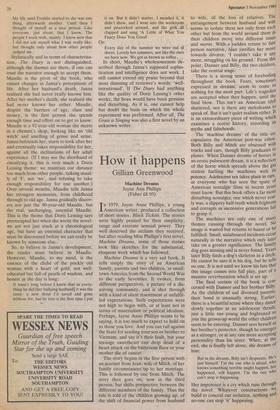How it happens
Gillian Greenwood
Machine Dreams Jayne Ann Phillips (Faber £8.95)
In 1979, Jayne Anne Phillips, a young American writer, produced a collection of short stories, Black Tickets. The stories were highly praised for their simplicity, range and extreme sensual power. They well deserved the acclaim they received, but after reading Miss Phillips's first novel, Machine Dreams, some of those stories look like sketches for the substantial, eloquent work which has followed.
Machine Dreams is a very sad book. It tells simply the story of an American family, parents and two children, in small- town America from the Second World War to the early Seventies. It evokes, from different perspectives, a picture of a dis- solving community, and is shot through with a kind of silent resentment at unfulfil- led expectations. Such expectations were not high to begin with, or at least not in terms of materialism or political idealism. Perhaps, Jayne Anne Phillips seems to be saying, it is too much to expect to hold on to those you love. And you can rail against the State for sending your son or brother to Vietnam, and say it's their fault, but your teenage sweetheart can drop dead of a heart attack on the bathroom floor or your mother die of cancer.
The story begins in the first person with an account from Jean, wife of Mitch, of her family circumstances up to her marriage. This is followed by one from Mitch. The story then goes on, now in the third person, but shifts perspective between the different members of the family. Thus the tale is told of the children growing up, of the shift of financial power from husband to wife, of the loss of relatives. The estrangement between husband and wife seems to isolate them not only from each other but from the world around them as their children move into different times and mores. With a sudden return to first person narrative, Jean justifies her move towards divorce: 'I couldn't take it any more, struggling on his ground.' From this point, Danner and Billy, the two children, take the central stage.
There is a strong sense of foreboding throughout the book. Fears, sometimes expressed in dreams, seem to come to nothing for the most part. Life's tragedies are accepted when they happen, until the final blow. This isn't an American idyll shattered, nor is there any melodrama to speak of. But it isn't quiet realism either. It is an extraordinary piece of writing which examines a recent history, recording its myths and falsehoods.
The 'machine dreams' of the title en- capsulates the American post-war ethos. Both Billy and Mitch are obsessed with trucks and cars, though Billy graduates to planes. When Danner dreams of horses in an erotic pubescent dream, it is a reflection of the horse which spreads above the gas station fuelling the machines with its potency. Adolescent sex takes place in cars, as everyone who has seen the spate of American nostalgic films in recent years must know. But this book offers a far more disturbing nostalgia, one which never real- ly was, a slippery half-truth which frightens and corrupts as successive generations fail to grasp it.
The machines are only one of many themes running through the novel. No image is wasted but returns to haunt or be fulfilled. Small, unlaboured incidents occur naturally in the narrative which only later take on a greater significance. The familY dog goes missing and is never found. Years later Billy finds a dog's skeleton in a ditch. He cannot be sure it is his dog, but he tells no one. It is not until we know his fate that this image comes into full play, part of a massive reverberation which is set up.
The final section of the book is con- cerned with Danner and her brother Billy. As the children of sad divorced parents, their bond is unusually strong. Earlier, there is a beautiful scene where they dance slowly together at an adolescent thrash, just a little too young and frightened to join the grown-up world the other children seem to be entering. Danner sees herself as her brother's protector, though he emerges as a stronger, or at any rate more accepting personality than his sister. When, at the end, she is finally left alone, she dreams of him: But in the dreams, Billy isn't desperate. He's just himself. I'm the one who is afraid, who knows something terrible might happen, has happened, will happen. I'm the one who can't stop it happening.
Her impotence is a cry which runs through the novel. Whatever constructions we build to conceal our isolation, nothing and no-one can stop 'it' happening.










































 Previous page
Previous page